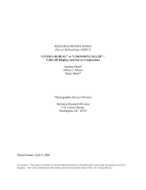
An official website of the United States government
Here’s how you know
Official websites use .gov
A .gov website belongs to an official government organization in the United States.
Secure .gov websites use HTTPS
A lock (
) or https:// means you’ve safely connected to the .gov website. Share sensitive information only on official, secure websites.
-
//
- Census.gov /
- Library /
- Census Working Papers /
- "Census Bureau" vs. "Unknown Caller"
"Census Bureau" vs. "Unknown Caller": Caller ID Displays and Survey Cooperation
"Census Bureau" vs. "Unknown Caller": Caller ID Displays and Survey Cooperation
Abstract
Survey sponsorship is known to play an important role in eliciting survey cooperation, and research also suggests that government-sponsored surveys enjoy higher cooperation rates than non-government surveys. The U.S. Census Bureau generally seeks to take advantage of this fact, and its particular name recognition, when contacting American households and businesses to conduct its census and survey operations. Thus the Census Bureau responded with some alarm when it was discovered that outgoing calls from its telephone call centers were displaying “UNKNOWN CALLER” on Caller-ID systems, an unanticipated result of displaying a toll-free number for respondents= return calls. In the fall of 2005 the Census Bureau took action to remedy the situation, and return to a “US CENSUS BUREAU” Caller-ID display. This paper reports on an evaluation of the extent to which the intended change actually occurred, as well as a before-and-after investigation of the impact of the procedural change on respondent cooperation. The implementation evaluation consists of the results of test calls from each of the Census Bureau’s three telephone call centers to the Caller-ID-equipped home telephones of two Census Bureau field staff in each state (approximately 300 calls, in total). These calls reveal a very hit-and-miss implementation of the intended display – “US CENSUS BUREAU” or a close variant appeared in only 56% of the calls – with substantial variation across different states and regions. To assess the impacts of the Caller-ID “switch,” we examine two Census Bureau surveys – the Telephone Point of Purchase Survey (TPOPS), a survey using random-digit-dialing sampling methods, and the American Community Survey (ACS), a survey that uses telephone interviewing as a first stage nonresponse follow-up to a mailed questionnaire. We find some evidence, in both survey contexts, of small positive impacts on both the efficiency and extent of contact with potential respondents, and on the likelihood of cooperation with an initial telephone interview. Evidence concerning the impact of the switch on cooperation with a subsequent TPOPS interview request (attrition) is decidedly mixed, however.
Others in Series
Working Paper
Working Paper
Working Paper
Share
Related Information
Some content on this site is available in several different electronic formats. Some of the files may require a plug-in or additional software to view.
 Yes
Yes
 No
NoComments or suggestions?


Top

